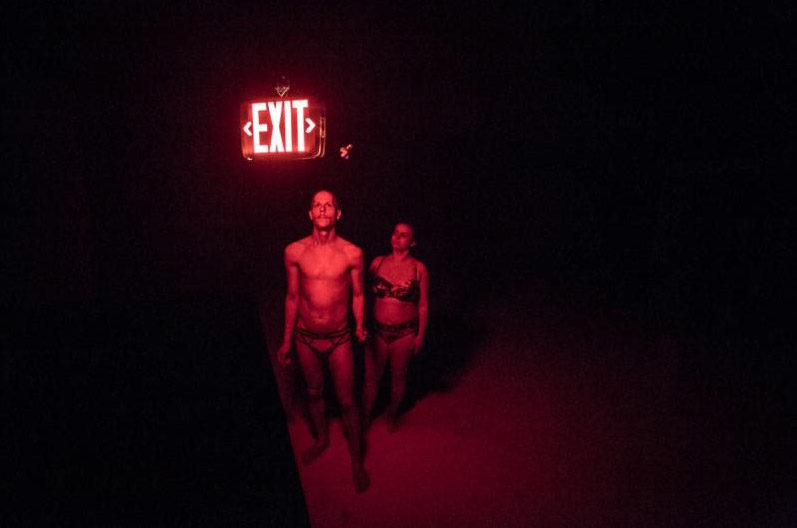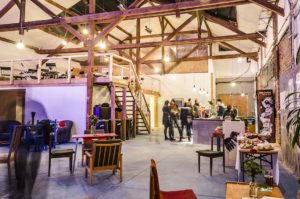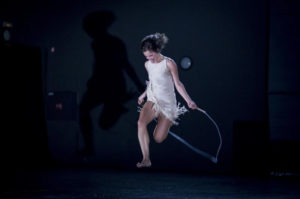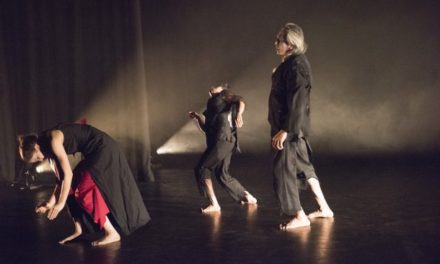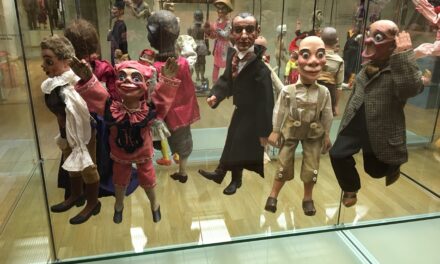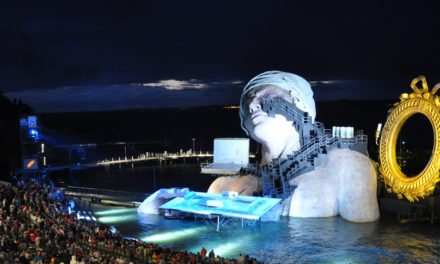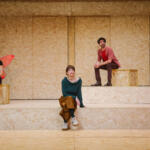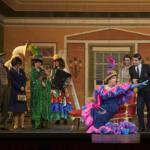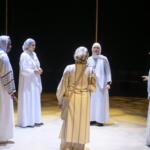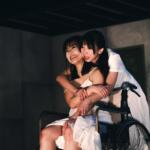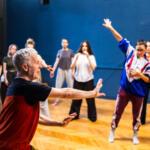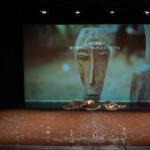
At the Mala Inventura Festival in Prague enthusiasm is viral.
Evidence of this is the Studio Alta, which has been the festival centre for the last couple of years: old warehouses of Zone 7 converted in 2008 into a contemporary theatre venue. In the huge café next to the stage – sort of a cozy shed with beams under a 10 meters high ceiling – everything comes from recovered materials and donations: armchairs, tables were given by sympathizers… Eva, who teaches at the Academy of Performing Arts, confirms that the couch I’m slumping onto was once hers. “You’re in one of the best cafés in Prague,” she adds while asking me if I can get her a hotdog at the bar. Supported by the Nova Sit network, Mala Inventura (“Small inventory” of about thirty shows) celebrates its 15th edition this year. Its director, Adriana Svetlikova, leads a long term endeavor to consolidate this showcase aimed at local and foreign professionals, and rather focused on short and experimental forms. An unmissable event to discover some of the best of Czech contemporary stage creations.
Other place, other atmosphere. The Archa theatre is located in a small alley halfway between Florenc and the Venceslas square, in front of a vegan canteen and a Starbucks café: welcome to Prague in the 2010s. Busking Un/Limited, by the Spielraum Kollektiv (conceived and directed by Linda and Mathias Straub), is a kind of weird cabaret flirting with documentary theatre. The audience is seated in parties of four and is presented testimonies from real street musicians talking about their struggle, the evolution of the legislation, the real money they make (about 15 000 crowns, i.e. 550 euros, per month, for the luckiest of them). In the heart of the stage arrangement, a mischievous voting system that forces the spectators to be involved in the discussion; an unfortunately under-used system that only really worked when the following question was asked: “If your street became unbearable to live in because of the noise caused by tourists and buskers, would you 1) Move out or 2) Complain to the local authorities?”: everyone who chose the former choice was gently asked to get up and sit at another table! (Hey, guys, you’ve got to own up to what you’ve done!) The weirdness award, though, would have to be attributed to two other unsettling shows: the first one, μSputnik, already seen at the Pilsen festival last September, is the miniature reconstitution of Russian space adventures… for an audience of one! Twelve minutes of pure historical poetry. The second one, Appetizers, is the proof that one can make a puppet piece with a flying eggplant and a showy beatboxing pineapple. The Czechs from Juanitas Bananas definitely tucked into hard drugs.
Early in the following morning. A stone’s throw away from the hotel, I stumble across the giant portrait of Vaclav Havel that covers the façade of the DOX, a hip contemporary art centre. Later, for the inevitable stroll in the City of one hundred spires, it is best to have a trdelnik in the left hand and a flask of absinthe in the other. Just about the only way to survive the crossing of the tourist hordes at the Charles bridge. Small disappointment though: I can see none of the musicians from the night before. While waiting for the PONEC to open (a hotspot for contemporary dance in Prague), I find refuge in the Muffin Concept, a small and cozy tea room – a haven of old 1940s swing – that contrasts strongly with the unfriendly environment of railroads and fast lanes. Later, I attend Guide by Vera Ondrasikova: a fast-paced performance that pushes the boundaries of technology one step further, using jarring shadow and light effects. I would have liked a more powerful narrative and less repetitive mirroring moves, but it is definitely hard not be overwhelmed by this jaw-dropping visual choreographic ecstasy. With Swish, Tereza Hradilkova invites us to an enthralling trance: while a saturated and effects-loaded guitar is played live by Filip Misek, we are confronted with a quest of time, memory and childhood, consisting in 38 minutes of almost non-stop jumping rope until the body of the performer collapses. Intense and upsetting. A shared feeling after the performance of Resolution, by Jana Vrana, at the alternative downtown theatre NoD: a top notch “audiovisual dance” that plays around the codes of postmodernism.
Before coming back to the Studio Alta, on Saturday night, there is one more surprising venue to be discovered. Once inside a nondescript building, one might wonder where the ugly staircase leads to: the entrance of a clandestine bowling place? A dodgy swingers club? In fact: to the Alfred ve dvore theatre, a small and yet remarkable contemporary creation venue, and, that particular evening, its duo of loony performers (Halka Tresnakova and Laszlo Fulop). Defying the laws of common sense, rendering each move and talk into its absurd expression, they stage with Plan B a humorous show that somehow manages to be both funny and irritating. Not long after this strange interlude, I end up on the dance floor of the festival centre. A DJ sharpens his turntables. At the other end, a pop corn machine seems to be making eyes at the guests. A cat strolls around the mezzanine from couch to couch. And the Mala Inventura logo, a seemingly tripping yellow chick, overlooks the café with its motto: “Divadlo je dneska hlavne o lasce”: “Today theatre is mostly about love.” Damn right.
Festival Mala Inventura, Prague, from February 22 to March 1, 2017.
This article was originally published in I/O Gazette n°54. Reposted and translated by the author. Read the original article in French.
This post was written by the author in their personal capacity.The opinions expressed in this article are the author’s own and do not reflect the view of The Theatre Times, their staff or collaborators.
This post was written by Mathias Daval.
The views expressed here belong to the author and do not necessarily reflect our views and opinions.

